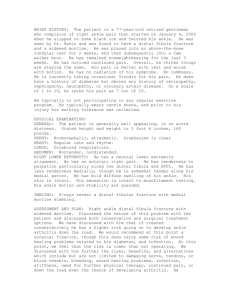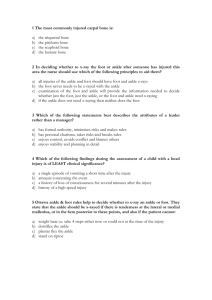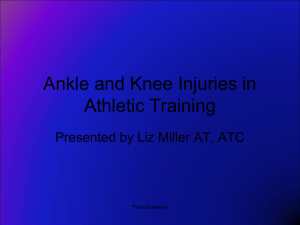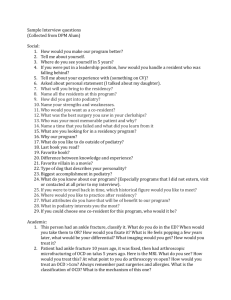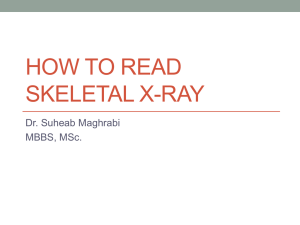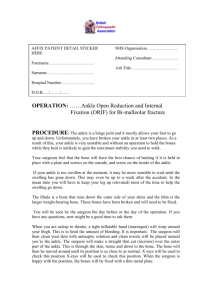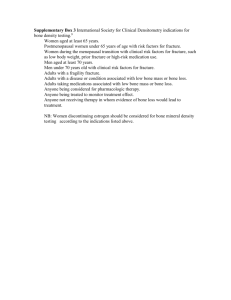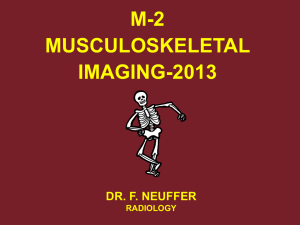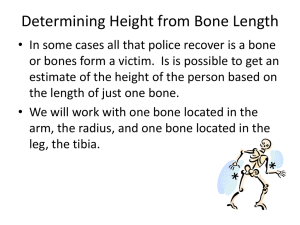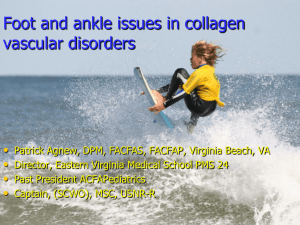NH3188 Emergency Clinical Practice: Master answer sheet
advertisement
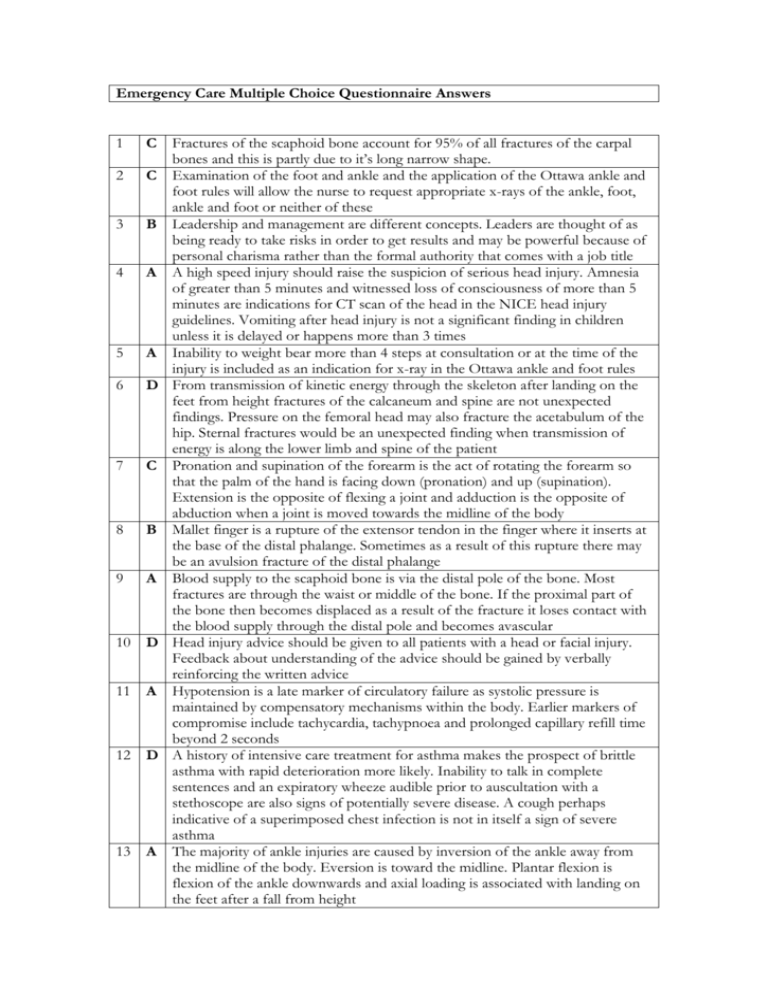
Emergency Care Multiple Choice Questionnaire Answers 1 2 3 4 5 6 7 8 9 10 11 12 13 C Fractures of the scaphoid bone account for 95% of all fractures of the carpal bones and this is partly due to it’s long narrow shape. C Examination of the foot and ankle and the application of the Ottawa ankle and foot rules will allow the nurse to request appropriate x-rays of the ankle, foot, ankle and foot or neither of these B Leadership and management are different concepts. Leaders are thought of as being ready to take risks in order to get results and may be powerful because of personal charisma rather than the formal authority that comes with a job title A A high speed injury should raise the suspicion of serious head injury. Amnesia of greater than 5 minutes and witnessed loss of consciousness of more than 5 minutes are indications for CT scan of the head in the NICE head injury guidelines. Vomiting after head injury is not a significant finding in children unless it is delayed or happens more than 3 times A Inability to weight bear more than 4 steps at consultation or at the time of the injury is included as an indication for x-ray in the Ottawa ankle and foot rules D From transmission of kinetic energy through the skeleton after landing on the feet from height fractures of the calcaneum and spine are not unexpected findings. Pressure on the femoral head may also fracture the acetabulum of the hip. Sternal fractures would be an unexpected finding when transmission of energy is along the lower limb and spine of the patient C Pronation and supination of the forearm is the act of rotating the forearm so that the palm of the hand is facing down (pronation) and up (supination). Extension is the opposite of flexing a joint and adduction is the opposite of abduction when a joint is moved towards the midline of the body B Mallet finger is a rupture of the extensor tendon in the finger where it inserts at the base of the distal phalange. Sometimes as a result of this rupture there may be an avulsion fracture of the distal phalange A Blood supply to the scaphoid bone is via the distal pole of the bone. Most fractures are through the waist or middle of the bone. If the proximal part of the bone then becomes displaced as a result of the fracture it loses contact with the blood supply through the distal pole and becomes avascular D Head injury advice should be given to all patients with a head or facial injury. Feedback about understanding of the advice should be gained by verbally reinforcing the written advice A Hypotension is a late marker of circulatory failure as systolic pressure is maintained by compensatory mechanisms within the body. Earlier markers of compromise include tachycardia, tachypnoea and prolonged capillary refill time beyond 2 seconds D A history of intensive care treatment for asthma makes the prospect of brittle asthma with rapid deterioration more likely. Inability to talk in complete sentences and an expiratory wheeze audible prior to auscultation with a stethoscope are also signs of potentially severe disease. A cough perhaps indicative of a superimposed chest infection is not in itself a sign of severe asthma A The majority of ankle injuries are caused by inversion of the ankle away from the midline of the body. Eversion is toward the midline. Plantar flexion is flexion of the ankle downwards and axial loading is associated with landing on the feet after a fall from height 14 15 16 17 18 19 20 21 22 23 24 25 26 27 C Eye opening response, verbal response and motor response are the 3 components of the Glasgow Coma Scoring system C Children in respiratory distress will adopt an upright (tripod or Fowlers) position to maximise respiratory intake. Nasal flaring and intercostal muscle recession are markers of increased respiratory effort. Children who are short of breath will not preferentially adopt a supine position C Any recent bleeding or anticoagulation is a contraindication to thrombolysis as is hypotension rather than hypertension C In lying supine the uterus may occlude the inferior vena cava and reduce cardiac filling leading to syncope. In pregnant trauma patients a wedge (Cardiff wedge) should be placed under the right side of the abdomen to avoid this A Ottawa ankle rules do not apply to patients older than 55 as they may have osteoporotic bone more likely to fracture. Children’s ligaments are relatively strong compared to adults and avulsion fractures are more likely and they are not included in the rules which apply to 12-55 year olds A Lewin identified autocracies typified by a top down approach to leadership, democracies typified by a collaborative approach and laissez-faire organisations typified by a ‘hands off’ approach to leadership A Jaw thrust manoeuvres minimise movement of the cervical spine which is important to avoid exacerbating or causing injury to the neck in patients who have suffered trauma. Head tilt and chin lift will involve movement of the cervical spine. B BAEM recommends the use of intranasal diamorphine which has more rapid onset than oral morphine solution (oromorph) and this may then be supplemented of necessary with intravenous morphine sulphate A The apparently drunk patient is particularly vulnerable in emergency care settings: they may be unable to provide critical details about their medical history, they may be more prone to bleeding if they are chronic alcohol abusers and staff may make value judgements about them being drunk that potentially affect the care they are given. The apparently drunk patient should be closely observed and assumed to have a head injury until proven otherwise B Apologising for the fact that the life of a loved one could not be saved may lead relatives to think that not everything that should have been done to save life was done. It may give the impression also that something that was done may have been done incorrectly C The size of the palm of the patient roughly equates to 1% of body surface area and this may be used as an estimate of the severity of burns and scalds where access to more formal tools such as the Lund and Browder chart is limited C The FLACC scale was developed to assess post operative pain in children by observing their behaviour and expression whilst Wongs smiley faces and the Oucher scale were developed to assess acute pain in children by interpretation of facial expression D Previous surgery to the pelvis or fallopian tubes and previous episodes of ectopic pregnancy has an association with an increased risk of ectopic pregnancy. There is also an association between smoking and incidence of ectopic pregnancy C The phalange of the finger nearest to the hand - i.e. the one that articulates at the metacarpophalangeal (MCP) joint (or the knuckle) is called the proximal phalange. The middle phalange of each finger is termed the intermediate or middle phalange and the one at the end of the finger is the distal or terminal phalange 28 29 30 A A democratic organisation is one in which there is a collaborative approach to management and leadership that involves all levels of staff within the organisation. Education and training is valued in such organisations and blame cultures are not associated with their working. Answer b) and c) typify a laissezfaire organisation where management is very much ‘hands off’ and there may be little co-ordination of activities. Answer d) typifies an autocratic organisation with a top down approach to management and leadership D Superficial burns and scalds with evidence of splash marks demonstrate brief exposure to the burning or scalding agent and a struggle to escape from it. Where the history provided does not seem to account for the injury sustained, where the burn is patterned or shaped as may result from deliberate burning with a domestic appliance such as an iron then suspicion of abuse should be raised. Lack of splash marks and a well delineated border to the burn or scald (a ‘tide mark’) is evidence of immersion in scalding fluid and either restraint of the child in the fluid or the child being too scared to attempt escape A Emotional abuse may also be a facet of the 3 other categories of abuse in children that are physical abuse, sexual abuse and neglect. Financial abuse may be a feature of elder abuse
